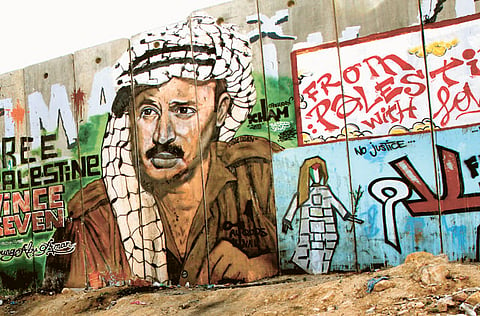An intimate portrait
A new documentary on Yasser Arafat includes his wife Suha Arafat's poignant recollections of the challenges they faced together

The name Yasser Arafat is synonymous with the Palestinian struggle. Affectionately referred to as Abu Ammar by his people and others, Arafat was a freedom-fighter-turned-revolutionary-leader-turned-politician. From his early days in Egypt as a decorated soldier, people around him knew he would one day become the president of Palestinians. This is according to a new documentary about his life and leadership style, called The Price of Kings — Yasser Arafat, which had its Middle Eastern premiere at this year's Dubai International Film Festival (DIFF).
Of course, this is not the first documentary about the leader, whom many considered controversial, but what makes the film unique is the personal briefings with people who were very close to him — from allies to family to rivals. By far the most intimate moments in the documentary are those in which Suha Arafat talks about her husband and the kind of life they shared together.
Shocking truths
Suha, who was very happy to be in Dubai and be part of the DIFF, had been very quiet after her husband's death; this is considered the first time she has shared her experiences of being Yasser Arafat's wife and has described some of the challenges they faced together. Some events she recalls are shocking, such as the time she had to wrap her newborn daughter Zahwa in a bulletproof vest as they left the hospital because of a bomb threat.
"Yasser Arafat was married to the Palestinian cause, and he had a second wife. This was not against the cause," Suha says.
Suha came from a political family; her mother was a journalist and an activist who was put under house arrest. Suha says that as a Palestinian from Nablus she had to live through many difficulties in life, and it is this that allowed her to help Arafat and resist with him.
After her marriage, Suha was kept busy with humanitarian work and the duty of receiving guests on Arafat's behalf. Having her daughter Zahwa, who is a teenager now, made her feel the suffering of Palestinian women even more, especially in refugee camps, and gave her a push to help the Palestinian people.
So how would she describe Arafat? First and foremost, she says, as does the documentary, that he was a patient man, someone who was misjudged because he was in the centre of a conflict and therefore an easy target.
Arafat would tell her, she says, not to care about personal attacks, as such people "would never throw flowers" at them. She remembers the many times he told her about Umm Kalthoum when she complained to Egyptian composer Abdul Wahab about criticism and he told her to stack the newspapers one on top of the other and stand taller.
"I am not Umm Kalthoum, but he (Arafat) was always giving me examples from history to teach me to be patient," Suha says.
But what was Arafat like in private? "The fact that he was brought up in Egypt meant that he picked up the unique wittiness that is inherent in the Egyptian character," she says. "Arafat was always full of anecdotes."
There is not a day that goes by that she doesn't think about him. According to her, Zahwa has inherited her father's character. She calls her "his double", in that she is very meticulous at home and has his "special temper".
More than ever, Suha says she remembers her husband now, during these Arab revolutions, because he was a leader who was never disrespected or disowned by his people. "He was loved by his people … Most dictators here are leaving because their people don't want them," Suha says.
Even though the focus on Palestine has shifted slightly, with different Arab countries focusing on regime change, she says an important aspect of the Arab uprisings is that Israel will not dare to carry out massacres in Palestine, because there will be consequences.
"Israel in the Arab Spring is limited, and the Palestinian population is more protected, even if it doesn't have a political solution," she notes.
Suha is clearly a fan of the present Palestinian leadership and says President Mahmoud Abbas is doing a great job and following in the footsteps of Arafat. His speech at the United Nations to seek recognition for Palestinian statehood is a case in point, she says.
While she keeps a low profile, Suha is aware of what is being said about her. In recent times, she was forced to leave Tunisia because of a fallout with the former first lady Laila Zine Al Abidine, but she says it is a closed case now and that she has moved on. She has fond memories of Tunisia, especially the time she spent there with Arafat. She resides in Malta at present, a very nice and cosy country, she says. Both her brother and mother live there as well.
Suha's participation in this documentary adds value and we certainly get a glimpse of the pressure Arafat was under, especially in his later years. But it is a very heavy task to talk about Arafat's leadership style and also cover seven decades of Palestinian history in 73 minutes. Many details about Arafat are left out and the documentary doesn't shed new light on his personal skills or even political skills.
There is also a lack of critical commentary from the panel of interviewees (and there are many Palestinian figures close to Arafat who should have been part of this). But the aim of this documentary is not to cast judgement on Arafat; instead it is about some of the people who knew him or were around him, and their personal memories.
Sign up for the Daily Briefing
Get the latest news and updates straight to your inbox



